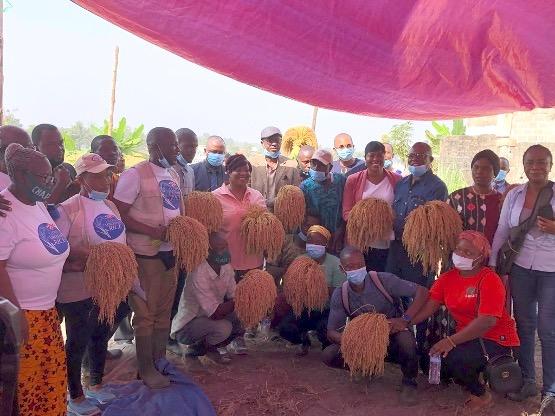‘Put Tariff on Imported Rice’

Vice President Jewel Howard Taylor (middle, with a bundle of paddy) poses with participants of the program.
— VP Howard Taylor suggests
Vice President Jewel Howard Taylor has stressed the need for the government of Liberia to increase the tariff on imported rice as a way to stabilize domestic production.
She said that farmers are not making much profit from locally cultivated rice due to the high production cost, which leads to the increase in the price of the commodity, causing it to be unaffordable.
According to her, once the tariff is increased on imported rice and the government ensures more subsidies to local farmers, the price of rice will drop to enable smallholder farmers to make more money.
She spoke recently during the launch of the Liberia Feed Rice Business Harvest in Paynesville, an event organized by the Community of Hope Agriculture Project (CHAP), a local non-governmental organization.
The event was attended by some distinguished personalities including former President Ellen Johnson Sirleaf, officials of the Ministry of Agriculture and the Land Authority, as well as the resident representative of UNDP Liberia, and others.
But while it would appear that the proposal of the Liberian Vice President may help the sector, it runs contrary to the vision of President George M. Weah to make imported rice affordable for most Liberians.
The government has continuously suspended tariffs on imported rice that centers on the need to curb the concurrent increase in the price of rice and to make it more affordable for ordinary citizens.
“It is important to find a way to put a tariff on imported rice and provide inputs so the production of rice can become a priority. The Liberian rice is more expensive than the imported rice,” VP Howard Taylor mentioned.
The statistics from the government show that the country still spends close to US$200 million annually to import rice to ensure food security for its population of four million. Rice, Liberia’s staple, has been described as a political commodity for the nation due to the 1979 rice riot when the administration of late President William R. Tolbert attempted to increase the price of imported rice, also in order to support local production.
“Do you see how the people have brought suffering on us in Africa? Why should what we produce be more expensive than what we import? This shows that the government has a very critical role to play. How do we make this change happen is something that needs to be worked on,” she mentioned emphatically.
“This is the similar situation that we still experience for rice since 1979, which brought about the rice riot. There was gossip around during such time that rice could be sold for US$10.00 but when it did not happen, it brought about the conflict. We are still in that situation,” she added.
She told this newspaper in an exclusive interview that though the government has not allotted enough money in the national budget for agriculture, with the help of international partners there is more money to support the sector.
“We have attracted $ 73 million United States dollars from international partners to support agriculture. The government has not increased the budget for agriculture due to competing national priorities,” she explained.
President Weah has yet to significantly increase the budget for agriculture for the last 5-years, despite the sector being pronounced as a priority for his administration. Most of the funding for the sector is still derived from external sources.
Madam Howard Taylor further mentioned that it is the responsibility of every Liberian citizen to invest in agriculture.
“I want to call on the religious community, especially the churches, to rise up and assist the government in its effort to feed the nation. It is everyone’s responsibility to make sure that we feed ourselves as a nation. Religious leaders should mobilize their people to see the reason to grow enough food for the country,” she cautioned.
Also speaking at the program was the executive director of CHAP, Reverend Robert Bimba, who explained that the event was organized to demonstrate the success of the project.
Rev. Bimba, said the project with support from UNDP has cultivated 4 hectares and empowered several youths and women with incomes.
According to him, they are expected to harvest more than 15 metric tons of rice that will be placed on the local market.
He, however, outlined many challenges confronting the project and called on the government and its partners’ assistance to address the constraints.
For his part, Deputy Agriculture Minister for Planning and Development, Robert Fagans, called on the public to depoliticize agriculture.
Minister Fagans said that carrying out politics in the sector will hinder development.
Meanwhile, UNDP Liberia has expressed commitment to support the CHAP program to meet its objective. UNDP resident representative, Mr. Stephen Rodrigues, promised to provide all of the necessary support that will make the project successful.
